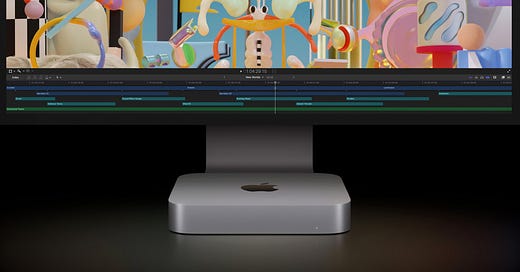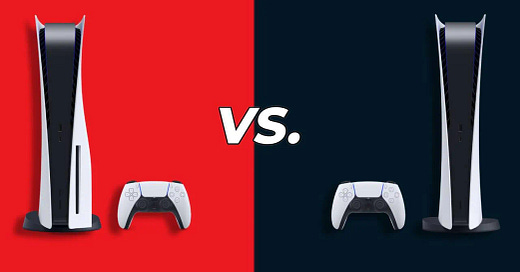
What Apple isn’t saying about new MacBook Pro and Mac mini M2 base SSD speeds
Slow entry-level SSDs hold back Apple’s newest computers, once again
➡️ The Shortcut Skinny: More Apple SSD woes
💻 2023 base model MacBook Pro and Mac Mini get slower storage
😬 Even the Mac Mini with M2 Pro chip and 512GB SSD is not immune
🍎 Apple did the same for the 2022 MacBook Air & 13-inch MacBook Pro
🤔 This is not new: older Macs with SSDs at all were pricey upgrades
Prospective buyers of the 2023 Mac Mini with M2, as well as the new MacBook Pro 14- and- 16 inch laptops, will want to exercise caution when choosing their storage level, as Apple is continuing a long tradition of putting its slowest storage in the cheapest models. An eagle-eyed YouTuber on the Brandon Geekabit channel, during a teardown of a base model configurations of the Mac Mini M2 and M2 Pro spotted by MacRumors, discovered that, for those with a 256GB SSD, only a single NAND chip is present, effectively halving storage speed versus the rest of the line, which uses double the chips.
Anyone who has followed Apple’s moves with its custom silicon macs will remember a kerfuffle around the M2 MacBook Air and 13-inch MacBook Pro with M2, which also each got slower storage throughput for its 256GB base models. The news was disappointing at the time for power users of Apple’s best laptop, particularly given Apple had done no such skimping when it comes to the SSDs in its first salvo of M1 Macs in 2021.
An investigation by 9to5Mac revealed the same for the M2 MacBook Pro line, when configured with a 512GB SSD – this doesn’t seem to have been the case for the 2021 lineup. Amid the dustup around the first MacBooks with M2 chips last year, Apple told the Verge performance would nevertheless be faster than previous models on machines with 256GB SSDs.
To complaints about this, I say: oh, you sweet summer child.
Nothing new under the sun
It’s not that it’s not a shame. Getting to fire up BlackMagic Disk Speed and watch your SSD soar to the multiple thousands is thrilling for those of us nerdy enough to know what the numbers mean, and throwing down for Apple’s obscene upgraded storage prices… it burns! It burns us! But that Apple would include slower storage in its machines is not a new idea, and it’s been far worse in the past.
In fact, it’s only been three years since the last iMac with a mechanical hard drive, the 2020 21.5-inch iMac – its cheapest all-in-one computer – with a 5,400RPM hard drive. Users of that machine were (and likely still are) severely bottlenecked by that mechanical disk.
And upgrading didn’t necessarily make things that much better. At the time, Apple used a hybrid storage solution that to the casual observer was a single drive, but which was actually an SSD and a standard hard disk. The thinking was that the computer would automatically keep the most-accessed data on the SSD to keep things snappy, and mostly it worked, but for power users routinely using lots of apps with intense file sizes, it could feel like a penalty.
Dropping the base (storage)
It’s not even the first time Apple has replaced superior storage with something worse, as the first fusion drives came with 128GB SSDs matched with a 1TB hard disk, while later versions dropped the SSD storage as low as 24GB –my 2019 iMac had a 32GB SSD component in its fusion drive.
Upgrading to the cheapest SSD at the time, with just 256GB of space, was a $100 premium, while jumping to 512GB cost an additional $300 – either way, a painful upgrade for a computer that was already $1,799 for the base configuration (the current 24-inch iMac starts at $1,299, for comparison). Spinning hard disks like those found in the fusion drive can get up to 250MB/s, at most.
All of that is to say that the SSD in the base models of these machines is a massive upgrade over that dark past, and Apple is probably right that, for most average users, there will be no discernible difference between a single NAND chip, which can post reads up to 1,500MB/s, and higher storage chip counts. It might be slower than the best SSD for PS5 or otherwise, but it’s still quite a speed boost.












